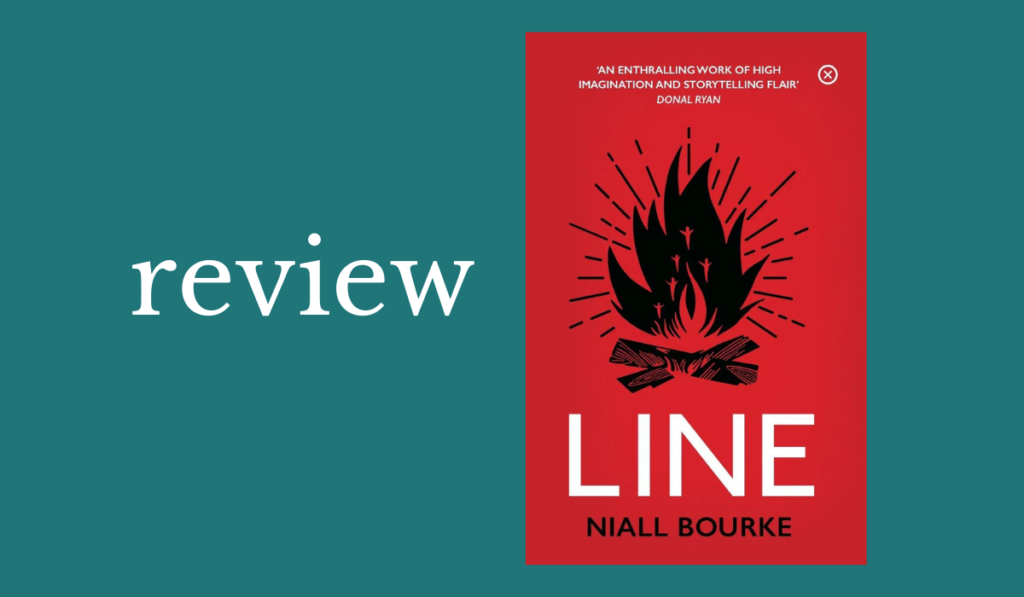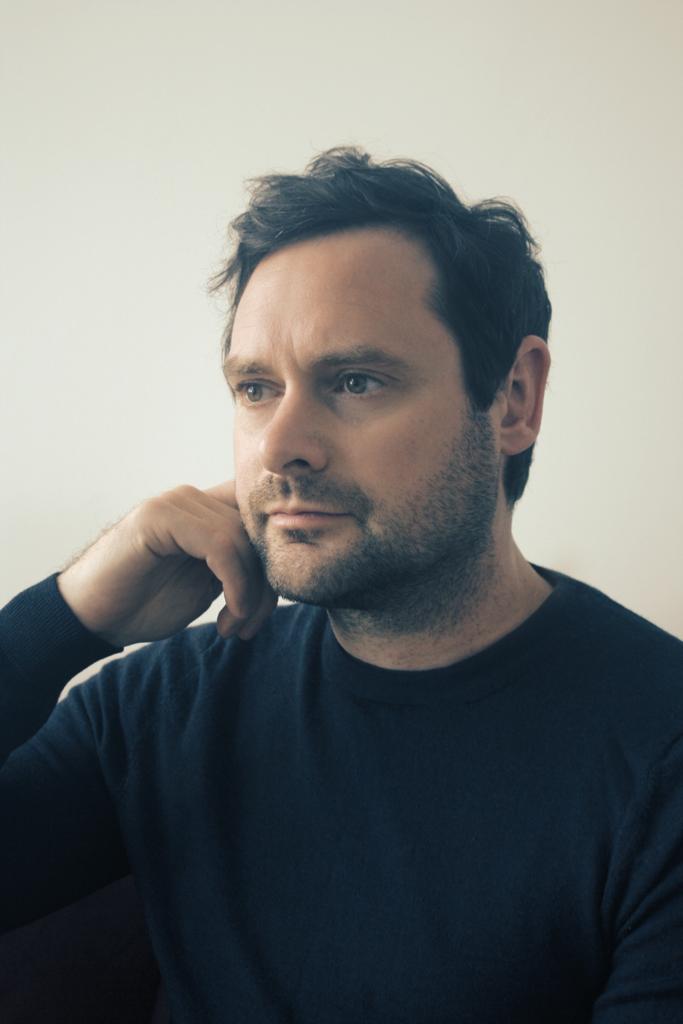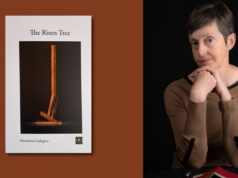
Line|Niall Bourke|Tramp Press 2021|ISBN:9781916291423|paperback|€13.99
by Eoghan Smith
Dystopian speculation has been a part of world literature for well over two hundred years.
Famous examples include Mary Shelley’s The Last Man, Aldous Huxley’s Brave New World, George Orwell’s 1984, and Margaret Atwood’s The Handmaid’s Tale. Recently, works by Irish authors, such as Sarah Davis-Goff’s Last Ones Left Alive and Sue Rainsford’s Redder Days, have contributed to the genre. Now there is Niall Bourke’s enjoyable and inventive debut novel, Line. Although set in the future, these types of narratives have always been more about imagining how unresolved anxieties of the present might contain the horrors of what is to come. Their success is often due less to the quality of the fiction than the lingering potency of the idea that is presented: what if a plague were to wipe out the majority of humankind; what if reproduction were controlled in such a way as to only allow humans that fit an idea of perfection to be created?
The ‘Line’ of Bourke’s title is essentially a gigantic queue, where people have been living in tarpaulined squalor for generations. Their hope is to get to the top of the queue, for reasons that are unclear to them except that this is what they must do.
When the Line moves, they must move too. The entire system is a socially-regulated hierarchy enforced through a coalition of managers named ‘Elders’ and the seemingly supine complicity of the majority of those in the queue, who between them collectively maintain the myth of an unspecified reward for reaching the end of the Line. Yet order is also maintained through an unforgiving regime of fear: there are sadistic punishments for skipping the Line (which is regarded as stealing), such as being tied to a tree and having your skin stripped by your neighbours and family.
The world these ever-migrating people inhabit is degraded and filthy. Toilet facilities are non-existent, there are no luxuries, and everyone is dependent on the ‘ration-drops’ organised by the Elders. Because the Line is transitory, there are no permanent settlements, farms, workplaces, or shops. Everything is temporary, everyone is dependent on these external, apparently arbitrary forces. This fictional world speaks to images from recent history emblazoned on our memories: UKIP’s infamous poster of migrants queueing to get into pre-Brexit Britain, the masses of people in tents in migrant camps in Calais.
In Line, people are waiting for something promised, something intangible; the destination is its own mythology, one which is cultivated by those in power whose interests it serves.
The central character of the story is a young man, the curiously named Willard B. Trophy. Willard lives with his mother, but after her death, Willard finds a strange book hidden in her clothes that will eventually lead him and his girlfriend, Nyla, to undertake a journey where there is ‘no going back’ to the city of Nodlon. Alerting us to the presence of some higher, organising power, Bourke layers his narrative with religious allusions, such as the Nativity plot of Willard and the pregnant Nyla’s journey towards the ‘Bethlehem’ of Nodlon, the Islamic-Jewish name of the mysterious god-like figure known as Ali Ben-Orkul, and the ‘Elders’ as types of priests, who are central to the maintenance of the mythology and who ensure devotion to the Line. Those people who abandon the Line, such as Willard’s absent father, are deemed ‘apostates’.
Bourke keeps the action between a handful of characters moving quickly. The dialogue is punchy. Occasionally, people speak with the faux-portentousness characteristic of fantasy epics. Willard’s desire to leave the Line is admonished by his mother: ‘you would have us betray our ancestors?’ she asks gravely; elsewhere we are told that things happen because ‘the emperors willed it so’. Yet if this is a fast-paced high-concept novel, there is also poetic beauty in Bourke’s romantically-accented prose:
“It is impossible to say how any of these movements begin, who decides upon them or what is in charge, whether they are the push and pull of some huge constant as the moon acting upon the tides or whether or they are a more organised lunacy, the lustrous violence of a shoal of bait-fish or the unknowability of any individual starling superseded by the swaying certainty of the entire murmuration.” (51)
Epigraphs from eighteenth-century economist Adam Smith and the then Federal Reserve Chairman, Adam Greenspan, in 2008, alert us that economics will sit at the thematic centre of the novel.
The emperors, it turns out, is an African corporation that has managed to become all-controlling through the harvesting of Big Data after the ‘third financialisation’ in world history; we are in an imaginary post-2008, post-Brexit world in which the global economic might of the Northern hemisphere has collapsed and where the new paradigm is ordered by self-interested economists. The second half of the book intersperses Willard and Nyla’s journey to the heart of the corporation in the hellish Nodnol, a soulless glass and steel city infested with discarded workers and where the buildings literally absorb human flesh. As the true and shocking nature and purpose of the Line is revealed, the reader is offered an intricate exposition of the ideological underpinnings and the physical structure of the Line through a series of imaginary, imitative academic articles, charts and graphs, which are highly elegant but deliberately absurd and intellectually shallow analyses of human cultures and behaviours.
Bourke has acknowledged in a recent interview that A Modest Proposal, Jonathan Swift’s 1729 satire on economics, is a significant influence on the novel.
Swift’s essay proposes that (among other things) the problems of extreme poverty in Ireland, which Swift witnessed first-hand, would be eliminated if the poor bred their children for consumption by the rich, thus generating economic activity and improving society at large (the poor would have more money and fewer mouths to feed; the rich would have more to eat and distribute their wealth to the poor).
A Modest Proposal is fundamentally an assault on the rationalist logic of an economics that prescribes mathematical cure-alls for complex problems, through which the entirety of humanity becomes the ultimate loser. It is not difficult to hear this echo of Swift in Bourke’s book, which is centered on the control of population and migration and the solutions offered by the behavioural analyses that underpin data-finance.
In creating an apparently fantastical world that is really the recognisable inverse of our own, Bourke employs another Swiftian technique from Gulliver’s Travels. So London becomes ‘Nodnol’; Africa the centre of global finance; and the hoards of migrants to be corralled and managed are impoverished Europeans. In such ways we are encouraged to view ourselves from a different perspective.
Because dystopian fictions tend to present the near-total victory of a single force over all others – be that a plague, patriarchy, religion, science, political ideology, or method of social control – the futures they offer play on a deep fear inherent in liberal democracies: the reduction of all life to a single, governing principle or organisation that removes all agency and freedom. Near-total victories, because all dystopian fictions contain characters for whom the hope of agency and freedom has not been completely extinguished, for whom an alternative world may yet still be possible.
In this context, Line is a provocative and intelligent commentary on the ways in which our contemporary societies are being manipulated by over-empowered economists and analysts who seek the Holy Grail of the ultimate algorithm. And like all dystopian fictions, it has much to say about how that future is now.

Eoghan Smith is the author of The Failing Heart (Dedalus 2018). His second novel, A Provincial Death, will be published by Dedalus in 2021.












